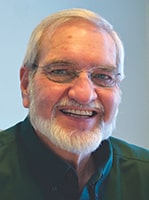Frank Fain, director of educational services at The Baptist Home in Arcadia Valley, Mo., likens retirement to the biblical concept of Sabbath, when believers should take the time to strengthen their relationship with God; give renewed attention to their relationship to family, friends and others; and come to accept themselves.

Frank Fain
Early in his career, a devout Jewish colleague who became a close friend told Fain pointedly, “Christians do not do the Sabbath” and, as a result, deny what the day was designed for in the first place.
Fain understood what his friend was saying as he noted how churches typically fill Sundays with a host of activities. Many of these activities do not necessarily help improve members’ vertical relationship with God or their horizontal relationship with others, let alone afford time alone with God for prayerful introspection.
As he researched the concept of Sabbath himself, Fain found an apt application in the concept of retirement after a life of work.
“Retirement was formed by humanity, not by God,”he said. “But God is there to make something good out of it — if we will let him.”
Fain believes life in America several generations ago was more conducive to focusing upon a person’s relationship to God. He contrasts life in agrarian America to life after the advent of the Industrial Revolution that began somewhere around 1760.
“When you were out in the field working, you had dead time to think about your relationship with God, your wife and your children,” he said. The same was true of other farming activities, even running errands into town.
Things were well and good in that regard until the Industrial Revolution, he believes. Long, hard workdays in factory settings changed all that for good, as far as Fain is concerned.
He vividly recalls his friend’s explanation of Sabbath as practiced by the Jewish community: “We use the Sabbath to improve our relationship with God,” improve horizontal relationships and to fall in love with self, his friend had explained.
These days, Fain has ample opportunities to counsel both adults in their senior years as well as younger people who either care for or relate to aging parents and their contemporaries. Proper use of the Sabbath informs advice he gives to people who anticipate or are living through retirement.
“I tell people they should look at retirement as their Sabbath,” Fain explained.
“Set goals for your spiritual relationship with God,” he said. That might mean reading the Bible in its entirety for the first time, or taking a religious course, attending other worship services beyond the usual or maybe improving a commitment to reading a daily devotion.
“I’m working on my vertical relationship with God” by engaging in such activities, he said.
He listed other ideas to improve horizontal relationships:
“I might set some goals for my wife and me to work on,” he said. Fain also suggested strengthening relationships with sons and daughters by forgiving them — even when forgiveness is years overdue — and telling them you love them.
“I might set some goals to teach my grandchildren who I am as a grandparent,” he added. “It might be a good time to talk with brothers and sisters” — perhaps to even resolve longstanding conflict with siblings or offer a word of forgiveness or apology to parents.
In short, retirement comes in the final stages of life when people can focus upon getting their affairs and relationships in order if they haven’t already done so. Fain believes retirement often affords the time to refresh and, if necessary, mend relationships with loved ones and friends.
“Then there is the internal (component),” he explained. Take time with family and others to be reminded of “who I am and what I’ve done” is the way Fain describes it.
That means taking responsibility for one’s own actions and decisions — and taking credit for them, too. It can be a healthy process of “falling in love with myself and even forgiving myself,” he explained.
Parents might reflect on their work years and realize they perhaps were too busy with the demands of vocation and effectively ignored their children as they were growing up, he said. Seeking forgiveness would be appropriate.
Even then, a person must practice self-acceptance, he maintains. “I may not have been perfect, but I did the best I could,” is an acknowledgement that can aid in self-acceptance and healthy self-love, he said.
Fain’s Jewish friend told him that at some point in every Sabbath, family members were expected to go off by themselves and spend time on their own relationship with God.
Retirement provides a good time for believers to focus upon the same Sabbath practice on an ongoing basis, he said. In so doing, many will discover a higher level of spiritual fulfillment during this phase of their lives.





